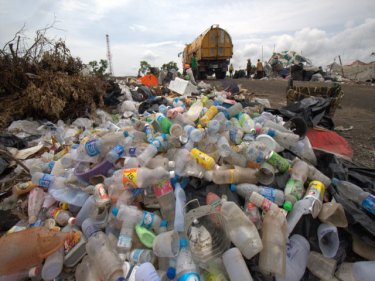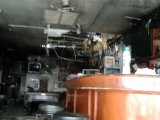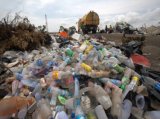PHUKET: Two of Phuket tourism's most essential requirements - a year-round water supply and an efficient means of disposing of garbage - raise alarm.
Meetings about water and garbage on Phuket over the past fortnight continue to skirt the key issues and to ignore potential solutions.
As is so often the case, administrators on Phuket put their hopes in technology rather than attempting to change attitudes and approaches.
Despite heavy monsoon rains this Phuket low season, the high season is likely to once again bring water shortages and the need for water to be imported.
Phuket's garbage continues to mount despite provision of a second incinerator, with the likelihood of overspills growing each day.
Here's an update on the two important Phuket issues, the most critical factors, and potential solutions:
ENOUGH water falls in Phuket's low season to supply Phuket with water all year long. Yet the officials overseeing Phuket's reservoirs who know best recently forecast that supplies will again run extremely low this high season, with some tourist areas likely to experience rationing.
The problem: the water that falls on Phuket during the low season mostly runs to the sea, often filling canals and causing flooding as it does so.
For decades, Phuket's rapid growth has outpaced the enlargement of its water suppy. A tourist island with resort-sized bathtubs, spas and swimming pools that need to be filled has to find ways of providing more water.
When Israel's Consul in Thailand, Eli Gil, visited Phuket last month, he suggested that Israel could help solve Phuket's chronic water shortage.
At a later meeting dealing with the water supply crisis, Vice Governor Dr Sommai Preechasin suggested taking up the offer. This is a great idea.
Around the world there are examples of places that have a similar problem to Phuket - heavy rain at one period of the year, no rain at other times.
Saving water is not difficult once the objective is plain and the community's needs are brought into sharp focus.
Year after year, Phuket, with reservoirs full, wonders where its water will come from in six months' time. The answer is plain: save the water when it falls.
As Eli Gil said, Israel has had to resort to desalination but that shouldn't be necessary on Phuket, where plenty of rain falls in the wet season.
In terms of budget priorities, provision of water all year long far outstrips Phuket's need for a convention centre or even a public transport system.
The answers are simple. Store the water that falls on Phuket for future use. Save the island from future embarrassment if, one of these days, it simply runs out of water.
The concept of conservation - building rain water tanks above ground or underground, making this kind of provision compulsory on new property estates - is not widely understood or promoted. It should be.
That lack of vision falls into the same category as the lack of a sustainable policy on garbage disposal through the ''Reuse, Reduce, Recycle'' philosophy, which brings us to . . .
EVEN more imminent than a water supply shortage is Phuket's mounting garbage disposal problem.
All of Phuket's garbage is transported to Phuket City's Saphan Hin dump, which as Phuketwan has reguarly noted is losing the battle to dispose of Phuket's waste.
Provision of a second incinerator has come just as the old incinerator broke down. Officials have now revealed that for 45 days every six months, the new incinerator will have to be closed for maintenance.
In other words, every year, Phuket will have at least 90 days' worth of garbage at 640 tonnes a day that it cannot dispose of through incineration.
It's possible to refit the old incinerator but the cost of 530 million baht has to be approved and much Phuket garbage will mount in the meantime.
Phuket's existing landfills are already stessed and the island will be unable to cope if, as is being predicted, Phuket's daily mountain of trash soars to 1000 tonnes a day.
Phuket's council administrations need to begin working now on a ''Reuse, Reduce Recycle'' campaign across all of Phuket.
Recycling especially needs to become part of Phuket's community thinking. The garbage mountain is out of sight, but not beyond the noses of those who live, work and play downwind.
The money spent on incinerators needs to be matched by a budget to promote the creation of less garbage.
ONLY WITH foresight and spending will an adequate water supply be provided for Phuket's future. Foresight and spending are also needed to reduce Phuket's garbage mountain to a manageable molehill.
With additional reporting from Prasit Tarnsirisin and Rattanawan Vatcharasorat












"All of Phuket's garbage is transported to Phuket City's Saphan Hin dump.."
I beg to differ. Look along the approach road to the new Kajonkiet campus (shared with the 'Heritage Suites' and 'The Valley 1') the land there is being used as a dumping site with apparently no supervision. Lorries are dumping there every day and at the end of each day the 'recyclers' come along to rip open bags, take what they want and leave the rest strewed along the side of the road.
In addition the road is covered in mud from the lorries making it dusty, unpleasant and dangerous for motorcyclists. I'm sure this is not the only such site on Phuket.
Posted by another steve on July 30, 2012 11:19